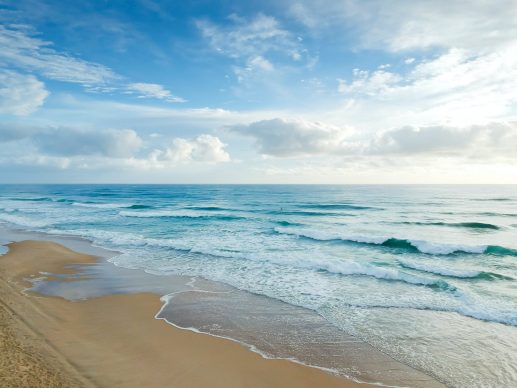If you live in a state that does not permit online gambling, then chances are you may have come across an offshore gambling site. While it might seem like a great opportunity to bet on your favorite football team or win a few bucks playing online poker, offshore gambling sites should not be trusted. When it comes to offshore sportsbooks and casinos there is no guarantee of your safety or that your chances are fair, as is the case at licensed and regulated online casinos and sportsbooks.
What is offshore gambling?
Offshore gambling encompasses any gambling that takes places at online sportsbooks, casinos, and horse racing sites operating outside of US borders. These offshore sites do not hold licenses to operate in US jurisdictions and are therefore unregulated. This means they may not be secure or have player protection measures in place to protect vulnerable players. You also have no way of finding out who is handling the money you deposit into an online account.
You can spot offshore gambling sites by looking at the website’s domain name. If a gambling site’s domain ends .EU or .AG, it does not hold a license to operate in the US market. Even if an offshore website is licensed to operate in the country of its headquarters, it doesn’t necessarily meet the regulatory standards put forth by US regulatory bodies.
Is offshore gambling illegal in the US?
Offshore gambling falls into the grey area, as each US state has different laws when it comes to online gambling. There are a handful of US states that have a licensed and regulated online gambling market. However, the majority of US states explicitly online gambling, which could be interpreted to include offshore gambling. In other states where the laws have not been updated to mention online gambling, offshore gambling falls into the category of unlawful gambling.
The offshore poker boom
In the early 2000s, the spread of online gambling was rampant. Many US citizens would gamble on pokers sites, such as PokerStars and Party Poker, which were especially popular in states that didn’t allow casino-style gambling. However, most, if not all, of these sites were headquartered overseas, or outside of the US.
With so many online poker platforms competing amongst each other for customers, some poker sites adopted an aggressive approach to advertising. This suggested these offshore poker sites were regulated or licensed, even though they weren’t subject to US regulatory standards.
Congress put a stop to this with a piece of legislation titled the Unlawful Internet Gaming Enforcement Act of 2006.
The Unlawful Internet Gaming Enforcement Act 2006
Introduced in 2006, the Unlawful Internet Gambling Act in 2006 prevented the use of certain payment methods, such as credit cards, for unlawful internet gambling. This meant that US banks could no longer process transactions for unlicensed and unregulated gambling operators. It was initially introduced as a means of forcing the offshore and illegal gambling market out of the US. The law prohibits unlawful online gambling operators accepting payments.
Although the introduction of this legislation managed to drive off some offshore operators, others continue to do business in the US to this day, flouting federal law. Of those offshore operators, there are several that carry out unfair, predatory and illegal business practices.
Absolute Poker (AP)
In an attempt to gain credibility, the offshore operator Absolute Poker (AP), managed to receive a license from the Kahnawake Gaming Commission (KGC). This was a quasi-legal regulatory body based in the Mohawk Tribe territory in Canada. However, while under the watch of the KGC, Absolute Poker became involved in one of the poker world’s biggest scandals.
In 2017, it was found that two employees at Absolute Poker were exploiting a flaw in the platform’s poker software and had stolen millions of dollars from the players that used the AP.
Eventually, the KGC carried out an investigation and it was revealed that there was cheating taking place. After issuing AP with a $500,000 fine, the site continued to operate and held onto its license.
Ultimate Bet (UB)
Even after the Absolute Poker scandal, offshore operators continued to do business in the US. Ultimate Bet (UB), another popular offshore site owned by Excapsa Software (the same company that owned Absolute Poker) became involved in a massive scandal. This platform also held a license from the KGC.
In January 2008, players on the Ultimate Bet platform reported that cheating was taking place. After an investigation carried out by the KGC it was found that the founder of Ultimate Bet had stolen tens of millions of dollars from players. By using a software exploit, certain users, dubbed ‘superusers’, had the ability to view all of the cards at a table. This was initially intended for testing purposes but some rogue account holders used this to cheat at the poker tables. This had gone on for several years.
The KGC hired Frank Catania, the former Director of NJDGE, to investigate these reports. After the investigation, Catania suggested that the KGC suspend Ultimate Bet’s license. This suggestion was rejected. Instead, the KGC issued the site with a $1.5m fine and forced the platform to reimburse players. Ultimate Bet did not have its license taken away and continued to operate in the US.
In the end, it was found that the KGC failed to prevent the incidents. It was clear that the KGC was more interested in protecting the two offshore platforms rather than protecting customers from the unsavoury business practices taking place.
At the time, Excapsa Software was publicly traded on the London Stock Exchange. Because Excapsa was a publicly traded company, it would come under more scrutiny for being involved in the scandals and even risked being shut down for flouting US law.
After the passage of the Unlawful Internet Gaming Enforcement Act, Excapsa announced it would sell its assets to a private company. The assets were sold to Tokwiro Enterprises ENRG. Following this, Excapsa became unlisted on the London Stock Exchange. However, the company was owned by Kahnawake Grand Chief Joe Norton, who had also purchased the Absolute Poker platform a few months prior. In July 2008, Absolute Poker and Ultimate Bet merged and became the Cereus Network.
Even after the scandals, the Cereus Network went on to become one of the biggest online poker platforms in the world, but eventually lost most of its player base. The platform was shut down on 12 May 2012.
‘Black Friday’
On 15 April 2011, the Department of Justice (DOJ) carried out an operation to shut down and seize the domains belonging to the offshore platforms that were operating in the US. These offshore platforms included Absolute Poker, Ultimate Bet, PokerStars and Full Tilt. The industry named this day “Black Friday.”
When the authorities looked into each companies’ finances, it was found that the Full Tilt, Absolute Poker and Ultimate Bet had grossly mismanaged player funds by not separating player funds from operating capital. Player funds were so poorly managed that the platforms were unable to pay back millions of dollars they owed customers.
Even after the scandals and Black Friday, the Cereus Network became one of the biggest online poker platforms in the world, but over time, lost most of its player base. The Cereus Network was shut down on 12 May 2012 and it was estimated that the company was $50m in debt. The majority of this debt was owed to US players.
PokerStars was able to repay all customers in full, but the Cereus Network and Full Tilt Poker had a combined debt that exceeded hundreds of millions of dollars, which has yet to be fully repaid.
The risks of using an offshore gambling site
The Absolute Poker and Ultimate Bet scandals highlight two extreme cases where offshore operators have posed a threat to US players. Aside from the issue of protecting players funds, there are several other risks associated with using offshore platforms.
Sometimes the random number generation (RNG) on games can be rigged, making it near impossible for a player to win a single game. Some offshore sites may even employ the use of unsavory business practices such as delaying cashouts, placing a limit on withdrawals or simply not paying out large prizes.
Offshore platforms also have a notorious reputation for not meeting player protection standards. There have been cases where an offshore site simply ignores requests or queries made by players. There are even reports where operators have used predatory advertising and deposit schemes with unfair terms and conditions. In some cases, they can also impose incredibly high fees on cashouts.
Why use regulated and licensed sites?
Regulated sites are required to meet standards set by state regulators. The NJDGE has earned the reputation of being one of the strictest regulatory bodies in the world.
The NJDGE requires all gambling sites to have employees that are dedicated to rooting out all forms of cheating and any exploits that could lead to fraudulent activity. The Division also requires all licensed operators to hold two accounts, one of those accounts is for operating capital and the other is to house player funds. This ensures that player funds are safe and secure.
Furthermore, the NJDGE will not allow affiliate sites that drive traffic to offshore platforms to operate within the state of New Jersey. In 2018, the NJDGE said that it had found that about 108 offshore sites were available to US players and that some affiliate marketing platforms were driving traffic to these sites.
In a letter to an affiliate driving traffic to an offshore operator, David Rebuck, Director of the NJDGE wrote: “The division will not license or register any company that is promoting illegal sites, as this activity negatively affects that company’s good character, honesty, and integrity.”
The NJDGE also carry out investigations and background checks to ensure that no ‘bad actors’ are granted permission to operate in New Jersey. If a company executive, owner or member of staff has a history of conducting unfair or illegal gambling operations, they will not be allowed to operate in the state.
Another reason to gamble with regulated platforms is that there are player protection methods in place to protect vulnerable players. Whether it be setting limits on deposits and game time or offering problem gambling resources, regulated sites are legally required to put players first. This is something the illegal market does not have to do as there is no one holding these platforms to account.
At the end of the day, legality aside, we recommend steering clear of offshore gambling and sports betting sites because of the lack of regulation. This means they may not be secure or may not have measures in place to protect vulnerable players who may be susceptible to developing a gambling problem. You also have no way of knowing who is handling the money you deposit into these online accounts.
For more updates on the US sports betting market and help to find legal and regulated sportsbooks Compare.bet has got you covered.


